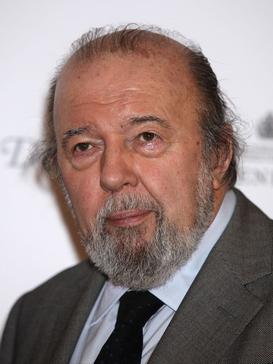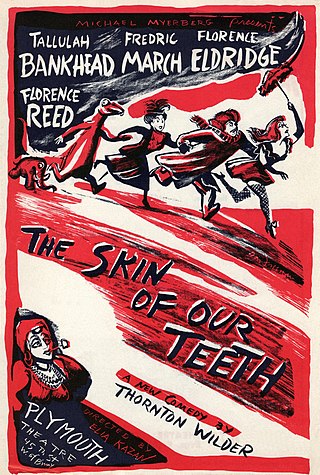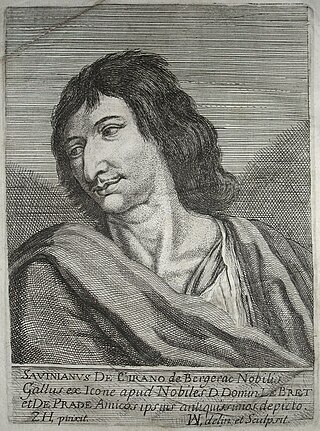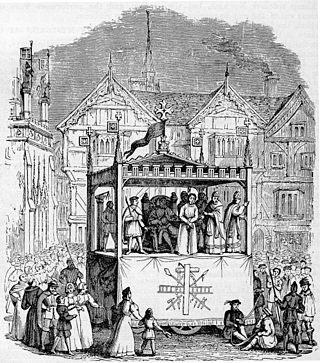
Edmond Eugène Alexis Rostand was a French poet and dramatist. He is associated with neo-romanticism and is known best for his 1897 play Cyrano de Bergerac. Rostand's romantic plays contrasted with the naturalistic theatre popular during the late nineteenth century. Another of Rostand's works, Les Romanesques (1894), was adapted to the 1960 musical comedy The Fantasticks.

Simon Phillip Hugh Callow is an English actor. Known as a character actor on stage and screen, he has received numerous accolades including an Olivier Award and Screen Actors Guild Award as well as nominations for two BAFTA Awards. He was made a Commander of the Order of the British Empire (CBE) for his services to acting by Queen Elizabeth II in 1999.

Stage combat, fight craft or fight choreography is a specialised technique in theatre designed to create the illusion of physical combat without causing harm to the performers. It is employed in live stage plays as well as operatic and ballet productions. With the advent of cinema and television the term has widened to also include the choreography of filmed fighting sequences, as opposed to the earlier live performances on stage. It is closely related to the practice of stunts and is a common field of study for actors. Actors famous for their stage fighting skills frequently have backgrounds in dance, gymnastics or martial arts training.

Sir Peter Reginald Frederick Hall CBE was an English theatre, opera and film director. His obituary in The Times declared him "the most important figure in British theatre for half a century" and on his death, a Royal National Theatre statement declared that Hall's "influence on the artistic life of Britain in the 20th century was unparalleled". In 2018, the Laurence Olivier Awards, recognising achievements in London theatre, changed the award for Best Director to the Sir Peter Hall Award for Best Director.

Christopher Fry was an English poet and playwright. He is best known for his verse dramas, especially The Lady's Not for Burning, which made him a major force in theatre in the 1940s and 1950s.

Sir William Tyrone Guthrie was an English theatrical director instrumental in the founding of the Stratford Festival of Canada, the Guthrie Theater in Minneapolis, Minnesota, and the Tyrone Guthrie Centre at his family's ancestral home, Annaghmakerrig, near Newbliss in County Monaghan, Ireland. He is famous for his original approach to Shakespearean and modern drama.

The Skin of Our Teeth is a play by Thornton Wilder that won the Pulitzer Prize for Drama. It opened on October 15, 1942, at the Shubert Theatre in New Haven, Connecticut, before moving to the Plymouth Theatre on Broadway on November 18, 1942. It was produced by Michael Myerberg and directed by Elia Kazan with costumes by Mary Percy Schenck. The play is a three-part allegory about the life of mankind, centering on the Antrobus family of the fictional town of Excelsior, New Jersey. The epic comedy-drama is noted as among the most heterodox of classic American comedies, as it breaks nearly every established convention of theatrical performances that was in effect when Wilder wrote it.

Benoît-Constant Coquelin, known as Coquelin aîné, was a French actor, "one of the greatest theatrical figures of the age."

Cyrano de Bergerac is a play written in 1897 by Edmond Rostand. The play is a fictionalisation following the broad outlines of Cyrano de Bergerac's life.
Theatre Kingston is a theatre company located in Kingston, Ontario, Canada.

Patrick Ewart Garland was a British director, writer and actor.

David John Threlfall is an English stage, film and television actor and director. He is best known for playing Frank Gallagher in Channel 4's series Shameless. He has also directed several episodes of the show. In April 2014, he portrayed comedian Tommy Cooper in a television film entitled Tommy Cooper: Not Like That, Like This. In 2014, he starred alongside Jude Law in the thriller Black Sea. In 2022, he was nominated for the Tony Award for Best Leading Actor in a Play for his performance in the Martin McDonagh play Hangmen. In 2024 he played Paul Peveril in 6 part BBC drama Nightsleeper.

Medieval theatre encompasses theatrical in the period between the fall of the Western Roman Empire in the 5th century and the beginning of the Renaissance in approximately the 15th century. The category of "medieval theatre" is vast, covering dramatic performance in Europe over a thousand-year period. A broad spectrum of genres needs to be considered, including mystery plays, morality plays, farces and masques. The themes were almost always religious. The most famous examples are the English cycle dramas, the York Mystery Plays, the Chester Mystery Plays, the Wakefield Mystery Plays, and the N-Town Plays, as well as the morality play known as Everyman. One of the first surviving secular plays in English is The Interlude of the Student and the Girl.

Thousands of performances of William Shakespeare's plays have been staged since the end of the 16th century. While Shakespeare was alive, many of his greatest plays were performed by the Lord Chamberlain's Men and King's Men acting companies at the Globe and Blackfriars Theatres. Among the actors of these original performances were Richard Burbage, Richard Cowley, and William Kempe.
Michael Cook was an English-born Canadian playwright known for his plays set in Newfoundland.

Chantecler is a verse play in four acts written by Edmond Rostand. The play is notable in that all the characters are farmyard animals including the main protagonist, a chanticleer, or rooster. The play centers on the theme of idealism and spiritual sincerity, as contrasted with cynicism and artificiality. Much of the play satirizes modernist artistic doctrines from Rostand's romanticist perspective.
Manana Antadze is a Georgian writer and translator, and founder of the Tumanishvili Theatre Foundation.

Seamus Finnegan is a Northern Irish playwright. He lives in London, and was born in Belfast Northern Ireland on 1 March 1949. In 2010, Finnegan and American academic Carolyn Cummings-Osmond were married in London.
Kim Renders was a Canadian writer, director, actor and designer and a founding member of Nightwood Theatre, the oldest professional feminist theatre company in Canada.
Hélène Loiselle was a Canadian actress living and working in Quebec.















